The Shoreline Community College Dental Hygiene Program (SCCDHP) has found its home on the UW School of Dentistry campus. Thanks to Shoreline, UWSOD alumni and corporate partners, that home has grown a little bigger.
In April 2025, the Access to Education Center (B-170) — a beautiful, state-of-the-art simulation laboratory used for pre-clinical activities — was completed. This new center provides the growing programs with the essential workstations and technology needed to continue training top-tier hygienists for Washington’s oral healthcare workforce.
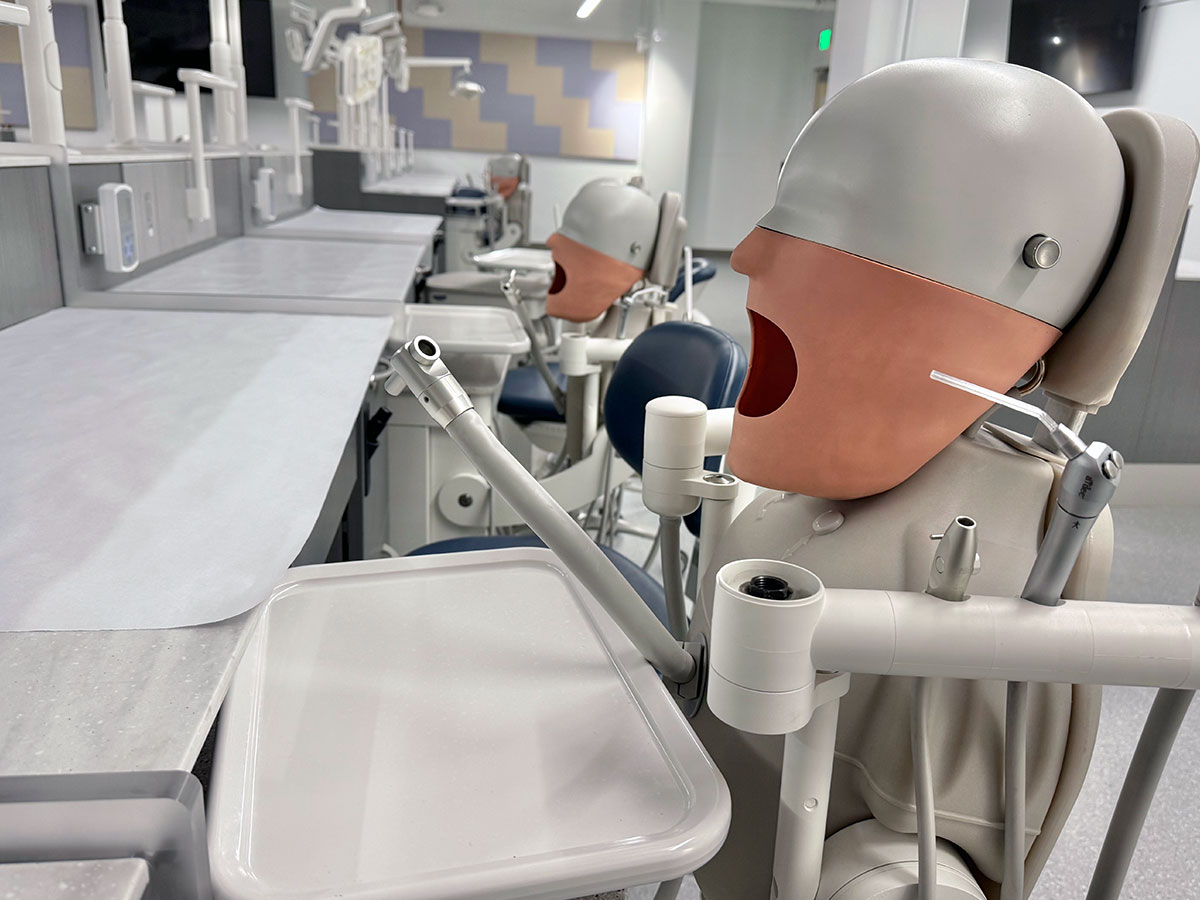
The SCCDHP’s move from Shoreline to Montlake in 2020 could not have come at a better time. During the global pandemic, the need for oral healthcare workers in Washington was so dire that it was recognized at the state level by both the Washington State Department of Health and Washington State Dental Association.
Simultaneously, infrastructure projects on the Shoreline campus threatened their dental hygiene clinic. Recognizing the benefits to both schools and the need for the workforce, the UWSOD and SCCDHP partnership was born.
To accommodate the move, the first SCCDHP class to begin their two-year training at UW was downsized from the usual 24 to only 10 students. Now, the current Class of 2026 has 20 students. The goal, as it has been since the plan was first announced, is to accommodate 30 dental hygiene students per class.
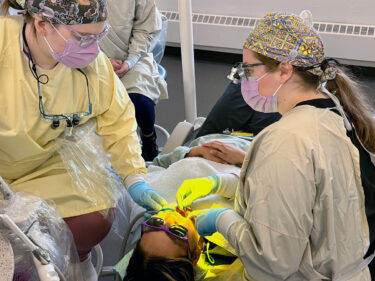
“The faculty, staff and students are very grateful to be included in the vibrant learning environment at UW for both clinical and pre-clinical activities,” said Dr. Nikki Honey, a Shoreline Dental Hygiene professor.
The SCCDHP now offers a Bachelor of Applied Science in Dental Hygiene — BASDH — degree, the first bachelor’s degree offered by Shoreline in its 60-year history. Successful completion of the BASDH degree requires an intense two-year curriculum including didactic, pre-clinical and clinical courses. To best assure student success in the program, applicants complete a detailed screening process before admission.
During dental hygiene training, students receive education and demonstrate competencies in periodontology, local anesthesia, and restorative dentistry. The UWSOD partnership allows dental hygiene students to work and learn side-by-side with DDS students in clinic, providing opportunities for both parties to learn and benefit from one another’s expertise.
After graduation, students must pass seven board examinations in order to apply for the RDH (Registered Dental Hygienist) license. This broad scope of practice allows dental hygienists and dentists to collaborate efficiently for optimum patient care. The SCCDHP is accredited by CODA — the Commission on Dental Accreditation — the same commission that evaluates and provides accreditation to dental programs.
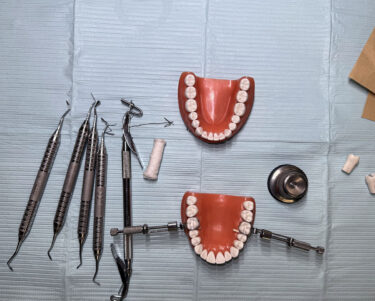
“We love being at UW because we get to build professional relationships with the dental students,” said Kennan Houser, the Shoreline Dental Hygiene 2025 class president. “Last year, our program was invited to go with the dental students who attend an annual service trip to Jamaica. Six of us went and stayed with the dental students. Now, when we see them in the halls, we recognize each other and say hi.”
Kennan, who’s from Bonney Lake, WA, received her bachelor’s degree in business from Grand Canyon University. After graduating, she worked as an orthodontic assistant for three years but felt she wanted an expanded role in oral healthcare.
“As a dental hygienist, we act more as a provider, and since I really value the relationship with patients, I wanted to continue with school and build a patient base.”
Kennan’s classmate, Taryn Aschim-Dawson, also worked as a dental assistant before joining the Shoreline program.
“Dental assistants are the backbone of the office, and sometimes patients see dental assistants more than the dentist,” said Taryn. “But with the scope of dental assisting, they can only do so much.
“Compare that to a hygienist who can actually perform cleanings and build rapport with a patient — that’s what made me want to pursue dental hygiene.”
Taryn lives in Mount Vernon, which makes for a long 60-mile commute each day to and from UW for training. For her, the value of the degree and the diverse career opportunities after graduation make all the miles on the road worth it.
Taryn likes that a dental hygiene degree provides her with diverse career opportunities, not just clinical work.
“There are so many routes we can take after graduation. We can keep pursuing education and become teachers, become representatives for a dental supply company or work in a dental office.”
Salina Thai, a second-year dental hygiene student from Tacoma, appreciates the security a dental hygiene role provides in an era increasingly defined by advances in technology and artificial intelligence.
“AI is a big deal right now, and dental hygiene isn’t one of those jobs that AI can take over because it requires hands-on care,” said Salina.
“I love the field, the hands-on work and the connection you make with patients.”
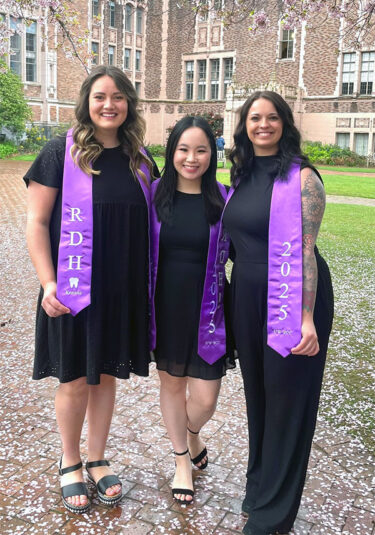
Salina, Taryn and Kennan are all now just a few months away from earning their dental hygiene licenses. It’s taken them two years of rigorous training, but their hard work and dedication will soon pay off.
After graduation, Kennan plans to work as a temporary hygienist in a variety of offices to explore different environments and find the best professional fit for her. “I’m excited to discover a practice I can call my professional home — where I can build lasting relationships with patients and make a positive long-term impact as a registered dental hygienist,” said Kennan.
Taryn plans to work closer to home but hopes that five to ten years from now she’ll have an opportunity to explore the country and work as a hygienist somewhere new.
Salina plans to become a temp after graduation to develop her skills. “I want to go through a variety of experiences and learn how to be the best healthcare provider I can be,” said Salina. “Learning from different offices will give me an idea of what works and what doesn’t before settling down and finding my career ‘home’.”
Having access to the School of Dentistry’s resources, including its facilities, students, faculty and patients, have all helped prepare the SCCDHP students for a successful career in oral health.
“Our partnership with the UW is what sets us apart from others in the state,” said Shoreline Dental Hygiene Professor Lori Simicich. “When dental students can see first-hand dental hygiene students’ level of competency and education in certain areas, they know how to utilize dental hygienists in a way that maximizes their scope of practice.”
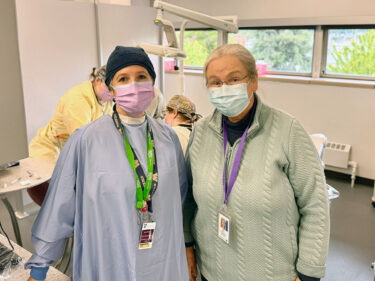
The goal for both programs is to eventually organize the curriculum so a singular dental hygiene student would be assigned to a few dental students through their program of study; that way the students could build upon relationships year-over-year, many of which could carry on into their professional lives.
All these considerations make renovations to the B170 dental simulation clinic all the more important. Not only do more UW School of Dentistry students get access to state-of-the-art technology, improving their training and knowledge of cutting-edge oral health skills, but their dental hygiene counterparts are gaining equal access to the same benefits.
“When you’re on UW’s campus, you get to say you’re in the Shoreline program, but that you also attend UW, which is a big name,” said Kennan. “We really do appreciate the partnership.”